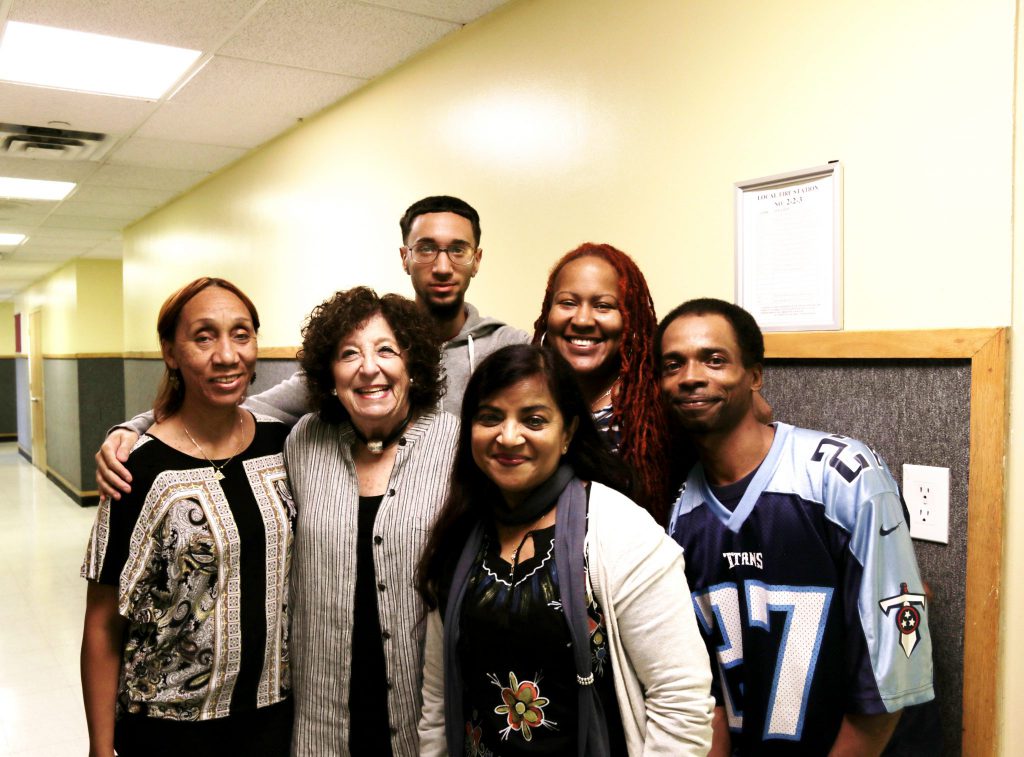News and Events
At HeartShare, we believe in keeping you aware of news and events throughout the agency. Be sure to visit our Events Calendar for important upcoming dates that may be of interest to you.
A Snapshot of Truly Beautiful People: HeartShare Employees Caring for those with Severe Disabilities
September 14, 2017
Disability Rights, Thought Leadership

These beautiful people from HeartShare’s Hoffman Day Habilitation Program are (left to right) Vivian Romero-Gambrell, Barbara Ornstein, Gilbert Jimenez, Molly Habib, Kimberly Samuels and Reggie Twitty.
Today, I was surrounded by beautiful people.
Stunning actually. Almost surreal. Yes, that beautiful.
Who am I talking about?
This morning, I ventured to Woodside with my colleague, Molly.
We were headed to HeartShare’s Henry Hoffman Day Habilitation Program, which provides services to adults with intellectual and developmental disabilities.
For those of you who aren’t familiar, day habilitation programs are for adults 21 and older. They can live at home with their families or at a HeartShare group home.
Adults at our day hab programs have varying abilities. Some of these adults can engage in a tour at the Museum of Modern Art. These are the folks we refer to as higher functioning.
These are the individuals that I mostly feature in HeartShare stories.
They can walk beside me and answer my questions.
They can remember my name or even give me a hug.
It’s easy to do that kind of a story.
I’m going on a trip.
I love my mom.
The Knicks are my favorite.
When is the dinner dance?
Are some of the things I hear. I can have a basic conversation. I can understand.
What about when you can’t talk?
For this very reason, the people who are non-verbal are excluded.
No words, no voice.
How about when you are non-verbal and use a wheelchair?
Well, that’s what I witnessed at HeartShare’s Hoffman Day Hab Program.
Over 80 profoundly disabled individuals who communicate with gutteral sounds — grunts, squeals, moans, laughter. They also might communicate with sign language. With a smile, or a blink of an eye.
The HeartShare team at Hoffman are filled with the love and the patience to listen.
To listen to the sounds and the body language of people who cannot speak.
These are the employees who wake up earlier than sunrise to ensure that all are up, have been changed and have eaten breakfast. Then, they get everyone, all in wheelchairs, safely onto the bus.
The bus takes program participants to the Day Habilitation Program. One by one, the lift goes up and down, bringing each person from the bus down to the street. HeartShare employees greet each person warmly and walk them individually upstairs to the program on the second floor.
We were waiting for David.
When we first learned that he’s been with HeartShare for over 20 years, we wanted to get to know him.
David is brought to his assigned room, which is decorated to reflect the work and interests of each person at Hoffman. One room, for example, is decorated with sashes. These sashes are for a parade — an invention of the program employees — to honor an individual at the program each month. A proud declaration that they are included, important, special human beings.
“We have come a long way, but this city is still not wheelchair accessible. And what about those who have customized wheelchairs that can’t fit through a standard door?” asked the assistant program coordinator. “So, we bring events (like the parade) to them.”
The reality is that the HeartShare individuals go out into the community — from runs at the grocery store to the Queens Museum — but their time is limited. Where can the program take a field trip where they can also find bathrooms to change adults?
Today, I watched HeartShare employee Reggie swab David’s mouth, encouraging him to grip the instrument in his hands to mimic and learn the brushing motion. When it was time for an art session, I watched Reggie show David how to spread and move the paint around on the paper.
Usually when you ask a HeartShare employee how long they’ve been at the company, it’s a number of years. 5 years, 21 years, 30 years.
6 months, Reggie says.
Do you have someone in your life with I/DD? I asked, immediately understanding how he might have found this line of work.
My brother. Growing up with my older brother. Autism, he said.
When it was time for lunch, it took an hour to prepare everyone for mealtime — to take out the bibs, to retrieve each person’s prepared meal from home and inspect the food to make sure the food matched their dietary restrictions.
Each staff member knows what everyone needs to eat. Say there’s a mixup and someone who requires pureed food sees the lunch cut into half inch pieces.
The employee immediately knows something is wrong and they go to the day program kitchen to fix it, explained the speech pathologist.
In addition to the many things we take for granted — like walking, hopping on a bus or getting up to go to the bathroom — the speech pathologist explains how she teaches each person how to swallow their food to prevent choking.
Enjoy your movie and you will be eating soon, says Molly, one long time frontline worker who has been at Hoffman for 17 years.
She’s comforting one of our program participants who doesn’t eat solid food due to a choking issue. Instead, the program participant enjoys classic movies while everyone finishes lunch and then, she makes a trip to the program nurse to eat lunch by feeding tube.
Once everyone has eaten, the employees break out musical instruments for the group to experiment with. David, like many at this program, are sensory. They enjoy touch, sounds. They hear the morocco, the tambourine. The keyboard, the xylophone.
You would think that the employees would be tired at this point, but they are not.
I’m only watching.
I’m exhausted.
I am going to win! says one employee in comedic defiance of her colleague. They’re speaking of decorating room doors with the program participants. It’s a contest.
We don’t want to be forgotten, someone tells me as I hug them goodbye. I realize that not many employees from administration come to visit them. I know their sadness is not only in the lack of recognition for the amount of work they do.
Their sadness is knowing the world doesn’t know about the severely disabled.
Not really.
Their sadness is knowing that the world won’t make room for them — either in accessibility or in their hearts.
These people are not the rosy cheeked pre-schoolers running around at our education programs.
These people aren’t adults with autism who have difficulty making eye contact when they speak to you.
These are people the world doesn’t want to look at.
And that’s how Willowbrook came to be.
When the world decided they could define some people as less than.
Although this injustice burns me to my core, I walk away with a sense of optimism.
A sense of awe.
A great joy for the caliber of our frontline workers.
I’ve never seen more beautiful people.
Jennifer Reres is Vice President of Communications at HeartShare, which supports and nurtures children and adults with intellectual and developmental disabilities.
Share
Website Footer
 Donate
Donate
Sign up for our newsletter

Click this logo to support HeartShare every time you shop at Amazon. For all eligible purchases, the AmazonSmile program donates 0.5 percent of the price to HeartShare.
Website by Manoverboard Inc.

